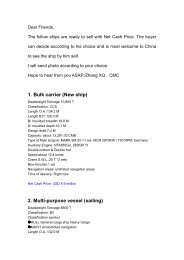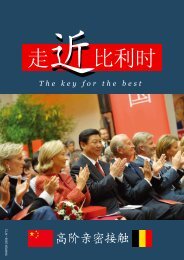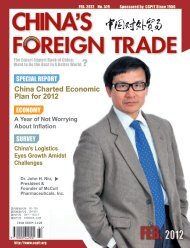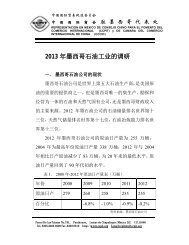F REIGN TRADE - 中国国际贸易促进委员会
F REIGN TRADE - 中国国际贸易促进委员会
F REIGN TRADE - 中国国际贸易促进委员会
Create successful ePaper yourself
Turn your PDF publications into a flip-book with our unique Google optimized e-Paper software.
NORTH AMERICAAmCham claims some of the competition unfair,saying that Chinese companies often receive preferentialtreatment in terms of credit, taxation and regulatorypolicy.However, regulatory factors are unlikely to be theonly reason for increased competition.Some argue the financial crisis, which has forcedmany Western companies to cut back on investment,has caused a shift in the balance of power. MeanwhileChinese companies, often cash-rich and less dependenton capital markets to raise funds, have taken advantageof depressed asset prices in Europe and the UnitedStates and have strategically bought companies to boosttheir competitiveness.A new factor, however, is that China's private sectoris rapidly upscaling from low-tech export-orientedmanufacturing to more high-tech sectors, which wasonce solely the preserve of foreign companies. TheChinese private sector is being driven into making thischange largely by rapidly rising labor costs.Concern over China’s long term growth pathThe report showed that the chief concerns of UScompanies have shifted from the investment climate tothe country’s medium-term economic growth path.China’s course over the next decade as it seeks astructural shift has become a big concern for the foreignbusiness community. They may think that there aresome ambiguities and uncertainties, but in fact, Chinahas given clear information, AmCham said.“The government is on track to make progresstoward a market economy by actively promoting theliberalization of interest rates and further improvingthe exchange rate mechanism, as well as deepening thereform of State-owned enterprises,” Dean said. “Chinahas no doubts about sticking to opening-up and graduallyadvancing its reforms in a cautiously optimistic way.A ‘shock type’ reform, expected by some people, is impossiblein China.”IPR enforcement to be strengthenedSeventy nine percent of respondents rate China’senforcement of intellectual property rights as ineffective.The percentage of respondents who rated China’sIPR enforcement as effective declined 9 points from lastyear. “At the time of the survey, respondents reportedseeing little progress on IPR protection, though newgovernment initiatives announced last year may yieldimprovements,” said AmCham China Chairman TedDean.Continued commitment to ChinaAfter several years of strong growth, US companiesin China have begun to temper their growth outlookdue to increasing concerns about slower economicgrowth, rising labor costs, tougher competition andfuture uncertainties.Despite these pressures, China is increasinglyviewed as a major growing market: 82 percent of respondentssurveyed plan to increase investment in their China operationsin 2012, with 66 percent saying their goal is to produce goodsand services for China, an 8 percent increase from two yearsago.U.S. companies remained relatively optimistic about China’smarket, while most of the surveyed companies expected togrow faster than China's real GDP this year, as they did in 2010and 2011.Besides, nearly three quarters of respondents believe thatslow or unstable Internet access affects their ability to efficientlyconduct business in China.The White Paper is AmCham China’s most importantand authoritative policy document. It is widely distributed andreferred to by officials in the Chinese and US governments, andwill be used by AmCham China as a basis for policy discussionand dialogue for the next 12 months.AmCham China is a national non-profit organizationrepresenting the interests of nearly 1,200 companies and 3,000individuals doing business throughout China. Headquarteredin Beijing, it has chapters in Tianjin, Northeast China (Dalian)and Central China (Wuhan).61

















